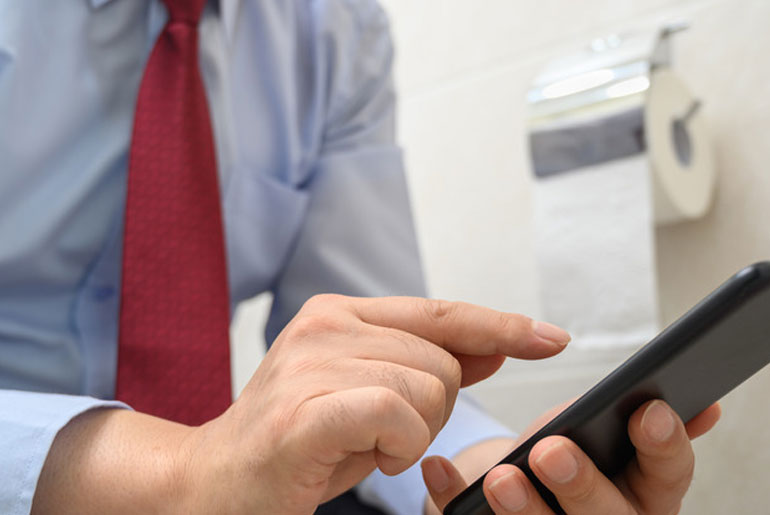Scrolling through social media while on the toilet has become a common habit, often leading to prolonged bathroom sessions. While this may seem harmless, sitting on the toilet for extended periods can have negative health effects. Physically, it can increase the risk of hemorrhoids and strain due to prolonged pressure on the rectal area. Psychologically, it may reinforce the habit of excessive screen time, potentially affecting mental well-being. Recognizing the importance of limiting time spent on the toilet can help prevent these potential harms and promote better health habits.
Spending too much time on the toilet:
Spending too much time on the toilet, especially while using a mobile phone, is not recommended due to the potential health risks. Prolonged sitting on the toilet can increase the risk of hemorrhoids or piles, as the pressure exerted on the rectal area can lead to swollen veins, causing pain, irritation, and bleeding during bowel movements. It can also contribute to constipation and difficulty in emptying the bowels. Additionally, extended toilet sessions increase the risk of exposure to harmful bacteria, potentially leading to infections like gastroenteritis, cholera, typhoid, and hepatitis. It’s advised to limit time spent on the toilet to no more than 7 to 10 minutes to avoid these health issues.
Changing your sitting position:
Changing your sitting position while on the toilet can indeed help alleviate issues related to bowel movements and prevent the development of hemorrhoids. Dr. explains that the conventional seated posture can cause straining because the angle of the hips and knees does not facilitate optimal alignment for easy bowel elimination. Squatting or using a footstool to elevate your feet creates a more natural pathway, aiding in smoother and more efficient waste discharge.
Dr. elaborates on the dangers of prolonged sitting, especially on a toilet seat, where the rectum is positioned lower than the rest of the buttocks. This posture, combined with gravity, causes blood to pool in the rectal veins, significantly increasing the risk of hemorrhoids. Straining during bowel movements due to constipation further exacerbates this issue, leading to the development or worsening of hemorrhoids. Dr. emphasizes that sitting on hard surfaces exerts more pressure on the rectal area than cushioned ones, but the most problematic is prolonged sitting on a toilet seat.
A sedentary lifestyle, characterized by extended periods of sitting without movement, is linked to poor blood circulation and sluggish bowel function, heightening the risk of hemorrhoids. To prevent this, Dr. recommends leading an active lifestyle, which includes regular exercise to strengthen rectal muscles, improve blood flow, and support healthy colon function. He advises taking hourly breaks to walk and increase circulation, keeping toilet time to a maximum of five minutes, avoiding straining during bowel movements, staying hydrated, and consuming a high-fiber diet rich in fruits, vegetables, and whole grains. These practices can significantly reduce the risk of hemorrhoids and promote better bowel health.
Disclaimer:
The information contained in this article is for educational and informational purposes only and is not intended as a health advice. We would ask you to consult a qualified professional or medical expert to gain additional knowledge before you choose to consume any product or perform any exercise.







